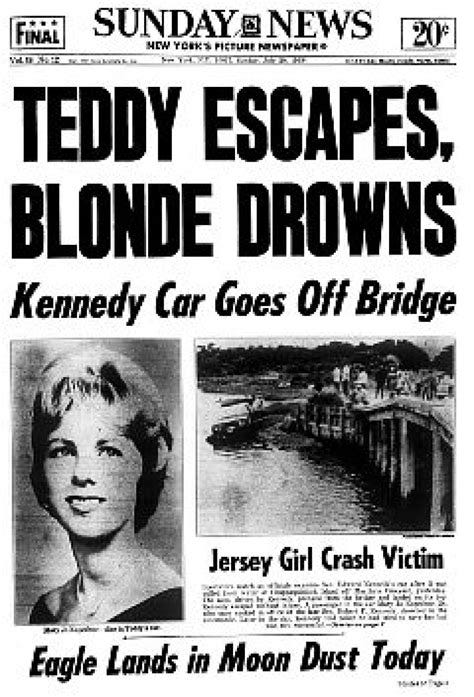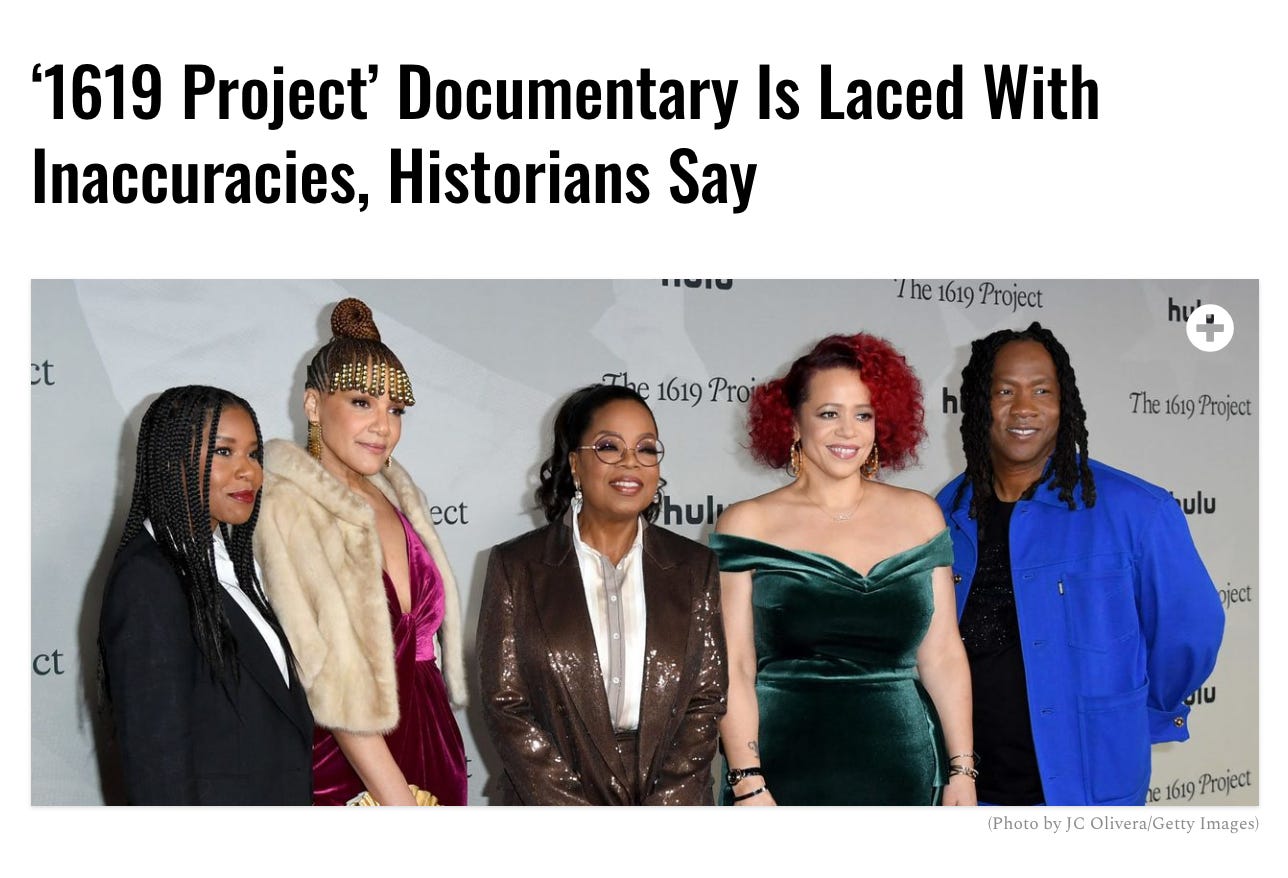

<< Sen. Teddy Kennedy let a girl drown at Chappaquiddick, after driving with his lights off to avoid detection on the way to a late-night extramarital liaison, and then didn’t report the accident for hours, passing houses with their lights on, while he tried to construct an alibi, ending with him asking his cousin to say he was driving.
The New York Times’ James Reston’s first sentence on Kennedy’s killing a girl was: “Tragedy has again struck the Kennedy family.”>>

The impatience within the newsroom ...was intensified by the generational failure of the Times to hire and promote women and non-white people, black people in particular. …
Diversifying the newsroom has turned out GREAT!
[I]t has been a revelation to [whites] that their skin colour was not just part of the wallpaper of American life, but a source of power, protection and advancement.
Our power is stupendous! Whereas Ketanji and Kamala got their jobs by being BETTER, SMARTER, FASTER than a white person.
And so a newsroom technology columnist might call for, say, unionisation of the Silicon Valley workforce, as one did, or an outside writer might argue in the business section for reparations for slavery, as one did, and to the average reader their work would appear indistinguishable from Times news articles.
The so-called “news” section of the Times became yet more opinion journalism — and you’ll never guess whose opinion it was.
I urged [Dean Baquet, executive editor] several times to add a conservative to the newsroom roster of cultural critics. That would serve the readers by diversifying the Times’s analysis …He said this was a good idea, but he never acted on it. I couldn’t help trying the idea out on one of the paper’s top cultural editors, too: he told me he did not think Times readers would be interested in that point of view.
Bennet suggests having one -- just one -- conservative cultural critic at the Times. Top editors: ONE IS TOO MANY!
News desks were urging reporters to write in the first person and to use more “voice” ..
This kind of lazy, narcissistic writing is the result of more girls in the news room.

The Times magazine, meanwhile, became a crusading progressive publication. …Its work was not labelled as opinion and it was free to omit conservative viewpoints.
Much like the rest of the paper.
The tiny redoubt of never-Trump conservatives in Opinion is swamped daily not only by the many progressives in that department but their reinforcements among the critics, columnists and magazine writers in the newsroom. They are generally excellent, but their homogeneity means Times readers are being served a very restricted range of views
Generally “excellent”? Charles Blow has written the same column one-to-two times a week for 15 years.
What’s the point in sucking up now, Bennet?
Once, when I told [Sulzberger] we were preparing an editorial series on nepotism within the Trump White House, he was quick to note that the Times was in a glass house when it came to such criticism.
That explains why the Times held Jared and Ivanka harmless – but how about the rest of the media?
Adam Rubenstein [an Opinion editor]…had received a note of praise from Sulzberger himself, for a piece by a former congressman, Joe Walsh, a Tea Party favourite who had called for a primary challenge to Trump.
Wow – you guys DO have a diversity of opinion!!! A Trump-hating, no-name former representative writes an op-ed … attacking Trump! Never could’ve seen that coming.
After police gassed protesters before Trump posed for a photo in Lafayette Square on June 1st, the editorial board, which I led, weighed in against that use of force and Trump’s “incendiary behaviour” …
Bennet still can’t shake the Times’ dust from his shoes. This is a classic NYT lie about law enforcement officers.
As the Inspector General’s report found, no federal law enforcement “gassed” protesters. The DC police -- under the control of the black mayor -- used gas in a different incident around the same time. And the Park Police had no idea Trump was planning to enter the park to “pose[] for a photo” or for any other reason. Yes, technically the clearing of the Park (no gas used) occurred “before Trump posed for a photo,” but you could also say, “police gassed protesters before Biden was sworn in.” One had nothing to do with the other.
See Politico: Park Police failed to warn BLM demonstrators before clearing Lafayette Park, watchdog says: ‘Are you freaking kidding me?’ incident commander replied when told of Trump’s presence
ON THE RESPONSE OF TIMES EMPLOYEES TO THE COTTON OP-ED:
Comment made on an internal message board:
“Amplifying a message that argues for MORE force only puts our own people in harm’s way, and undermines the paper’s commitment to their safety,”
Bennet won’t say who wrote this, but it’s one of these three -- Marc Tracy, Rachel Abrams Or Edmund Lee --and my money’s on the Asian. (Who knows what it’s like to be black in America better than an Asian?)
[A]fter the article [about the fracas] was published on the Times website, the editors scrambled to rewrite it, replacing “military force” with “military response” and “protesters” with “civic unrest”. That was a weaselly adjustment – Cotton wrote about criminality, not “unrest”... The Times did not publish a correction ...
The union condemned our publication of Cotton, for supposedly putting journalists in danger, claiming that he had called on the military “to ‘detain’ and ‘subdue’ Americans protesting racism and police brutality” – again, a misrepresentation of his argument. The publisher called to tell me the company was experiencing its largest sick day in history; people were turning down job offers because of the op-ed, and, he said, some people were quitting.

These are the same people who are constantly demanding we admire them for their bravery.
[Jim Dao, the op-ed editor] also dutifully itemised language that we might have softened, and said the headline, “Send in the Troops” should in retrospect have been made more palatable, if duller.
Woke politics makes everything boring.
Actual NYT headlines in the past few months:
“Using Dance to Tell the Story of Mozambique’s Struggles”
“How Unconscious Bias in Health Care Puts Pregnant Black Women at Higher Risk”
“Alok Vaid-Menon Is ‘Fighting for Trans Ordinariness”’
“Rikers Is Already Awful, and It’s Worse if You’re Trans”
Headlines such as “Tom Cotton’s Fascist Op-ed” [was] the headline of a subsequent piece …
That was the headline on a column by Michelle Goldberg, the Times’ fascist-spotter.
One of the ironies of this episode was that it was not any newsroom reporter but Rubenstein who wound up receiving death threats because of the Cotton op-ed, and it was the newsroom that put him in harm’s way.
Ironic, huh?
Early that morning, I got an email from Sam Dolnick, a Sulzberger cousin and a top editor at the paper, who said he felt “we” – he could have only meant me – owed the whole staff “an apology for appearing to place an abstract idea like open debate over the value of our colleagues’ lives, and their safety”…
Like his cousin, the publisher, Dolnick is a smart guy with a good heart, and I know he meant well.
Oh drop the false flattery! They’re not inviting you back, Bennet.
Before the company-wide meeting [with a couple of thousand people, about the op-ed] … Alex Levy, contacted me … to tell me to use whatever question I got first to apologise, and at some point to acknowledge my privilege.Why not? Six-year-olds at New York’s finest private schools have to.
[M]y Times colleagues demanded to know things such as the names of every editor who had had a role in the Cotton piece. Having seen what happened to Rubenstein I refused to tell them. A Slack channel had been set up to solicit feedback in real time during the meeting, and it was filling with hate. The meeting ran long, and finally came to a close after 90 minutes.
Sounds like a fun place to work.
[Sulzberger] did not explain why, if the Times was an independent publication, an op-ed making a mainstream conservative argument should have to meet such different standards from an op-ed making any other kind of argument, such as for the abolition of the police.
[Waving my hand frantically] I know! Because the Times is not a serious newspaper.
[I believed [Cotton’s op-ed was] a potentially consequential idea from an influential voice … and [readers] should know about it and evaluate it partly for that very reason.
Times colleagues who were frightened or angry about the piece had the opposite view: that readers should not hear Cotton’s argument. To expose them to it was to risk that they might be persuaded by an elected politician.Wait until Times readers emerge blinking into the light and find out about Table 43!
Thank you for reading Unsafe. This post is public so feel free to share it.